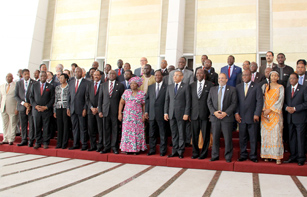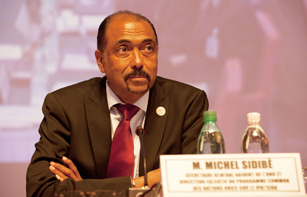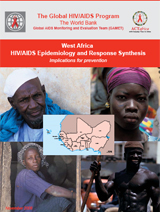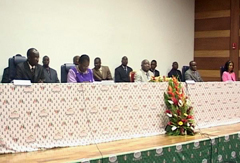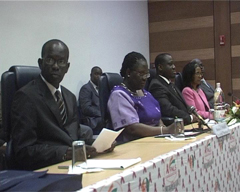This story was first published on UNFPA.org
SAN PEDRO, Côte d’Ivoire
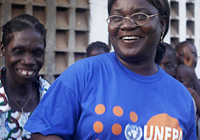 Midwife Odette Koffi-Brou.
Midwife Odette Koffi-Brou.
Photo: Jane Hahn/Panos/UNFPA “I’m here because I have four children,” explains a 48-year-old sex worker, who asked that her name not be used. Today she is being tested for HIV at a mobile health clinic, run by the volunteers of the Association for the Promotion of Mother, Child and Family Health (APROSAM) which is supported by the United Nations Population Fund (UNFPA).
After her husband died in an accident, she ran away from her home in Nigeria rather than marry his younger brother as is the custom in her region. With no means to support her children, or pay for their school fees, she turned to sex work to ensure her family’s survival. She earns as little as $2 per client and sends the money to her sister in Abidjan, where her children live.
Midwife Odette Koffi-Brou helped create APROSAM to serve the health needs of the residents of Bardot, one of the largest shantytowns in West Africa. Bardot is home to 80 per cent of San Pedro’s 160,000 residents. Each of its 24 districts is served by two APROSAM volunteers.
For Koffi-Brou, people who engage in sex work should not be stigmatized, but should be treated like any other client in need of health services.
“It’s not our role to talk them out of prostitution,” Koffi-Brou says. “Our role is to sensitize them and protect them against HIV.”
In Bardot, the majority of HIV infections are sexually transmitted or associated with parent-to-child transmission. HIV vulnerability, like poor sexual and reproductive health generally, is exacerbated by social drivers including poverty, gender inequality and social marginalization.
Bringing services directly to the people
Instead of trying to get people living in poverty to visit a doctor’s office, the clinic delivers services directly to their doors in the heart of the shantytown.
Inside the mobile clinic, a pristine reception area leads to the examination room with gleaming medical equipment. The clinic is clean, bright and very professional and is serviced by one doctor, one counsellor and a technician.
Dr. Pascal Attobrat is a volunteer doctor working for the mobile clinic. “We see how AIDS has invaded this population. It is very important to teach the population about how to prevent and treat this disease,” he explains. “Everybody is involved with this disease.”
“The mobile clinic plays a very important role,” said Philippe Delanne, the Côte d’Ivoire Representative for UNFPA, the United Nations Population Fund. “With its trained personnel and volunteers, it can reach multiple towns and villages targeting sex workers, internally displaced persons and those made vulnerable by the crisis in Côte d'Ivoire who might otherwise not have access to health services.”
Staying healthy and positive
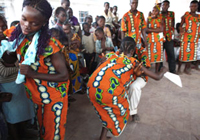 Local villagers come out to greet the
Local villagers come out to greet the
UNFPA team's arrival outside of a new
extension of the Bardot Center in
San Pedro. Photo: Jane Hahn/Panos/UNFPA Clinic volunteer Theodore Magui is HIV-positive. He is happy to be an example showing that you can be living with HIV and still in good health. When clients see a healthy person living with the virus that they also carry, they feel more comfortable in confiding in him.
Knowing your HIV status is empowering, Theodore insists. “When you live in ignorance and fall sick, it’s not good,” he says. “It’s better to have the test, know your status and get the medicine you need.
Stemming the spread of the disease
APROSAM volunteers also visit the homes of those living with the virus to offer support, prevent mother-to-child transmission and provide counselling about treatment.
HIV-positive volunteer Eloise Tohsede threads her way through the maze of shanty shacks. Tonight Eloise is visiting 32-year-old Cecile, whose baby girl was born five days earlier. Cecile’s partner left her when she tested positive for HIV. Her young son also tested positive for the virus, but she doesn’t know yet if her infant has contracted the disease. Eloise urges Cecile to seek treatment using her status certificate, which will enable her to get low-cost medication.
“I’m telling my sisters, ‘You are not alone. Your life can continue. You can take medicine and have hope,’” says Eloise, her smile lighting up the dim room. “If you take your medicine and continue to see a doctor, you can live a long time.”
Community-based AIDS response
UNFPA recognizes that a community-based approach, like that of APROSAM, is essential when responding to the AIDS epidemic and stemming its spread. UNAIDS supports this approach.
“Community-based initiatives are an extremely important part of a multisectoral national response to the AIDS epidemic as they can reach populations who are in real need and who otherwise have no means of access,” said UNAIDS Country Coordinator Cote d’Ivoire, Aoua Paul Diallo Diawara.
“Reaching people with the HIV services they need most is a critical step and a vital step towards achieving universal access to HIV prevention, treatment and care.”
UNFPA is funding the completion of a new maternity clinic in neighbouring Zimbabwe, mirroring the successful Bardot model. The equipped centre, which will offer HIV testing and treatment as well as other maternal and reproductive health services, will cost about $80,000 to complete.




